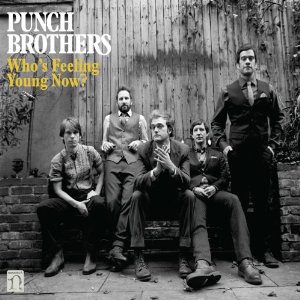Punch Brothers - Who's Feeling Young Now?

Among the vanilla-scented bands fuming up the record charts, the Punch Brothers stick out like a whiff of an everything bagel. Their calloused, virtuosic, bluegrass-picking fingers have been caught rummaging through the cookie jars of all sorts of musical genres, a habit which renders their music largely unclassifiable. Or, at best, they get filed under the mostly unhelpful label of "progressive bluegrass." Their first album, Punch!, featured an audacious 40-minute suite called "The Blind Leaving the Blind," which prompted some attempts to classify the band as a weird classical-bluegrass hybrid. But, having simmered down over the course of several years, the band's style has since acquired a more affable pop demeanor, though still just as smart. Their newest album, Who's Feeling Young Now, even features a cover of Radiohead's Kid A, hinting at what sort of listening audience the band is courting.
I double-clicked the opening track of WFYN and quickly developed a powerful urge to drop my gaze and bob my head from side to side. Movement and Location has a thoroughly addictive groove, energized by a certain anxiety, a melancholic hankering for some undefined musical salvation, and propelled by tenacious ostinati: the plodding basso-guitar combo, crunchy mandolin backbeats, and lightning-fast subdivisions in the banjo and fiddle. The understated reverb in which M&L is cast gives the feeling of vastness and profundity, amplifying the lyrical message. Reverb has a tendency to be regarded as cheap or gratuitous (I presume that to be especially so within the oft-reactionary bluegrass community), though the Punch Bros. pull it off tastefully. Having set an enormous musical precedent for the rest of the album, M&L is followed by a more traditional number, the ironic and sacrilegious This Girl, which at times sounds like the Beach Boys did a bluegrass album. A lilting mandolin line stumbles out of the gate, giving the track its characteristic finger-snapping, falling-forward momentum. Harkening back to their bluegrass roots, the instruments switch roles often, offering jazzy interjections when not contributing to the rhythmic drive or filling out tall, shifting harmonies.
 In spite of their musical upbringings, the Punch Brothers command an impressively diverse repertoire of styles, which mutate over the course of the album and even within individual tracks. The title track, for instance, lays down stylized unison vocals over a funky, Santana groove, growing to a sort of punkish, anti-establishment refrain. It's pairing, Clara, oscillates between a galloping, bass-driven sock hop and a sparse, lugubrious recitative. Even the lyric-free bluegrass crowd-pleaser Flippen digresses into one of the P. Bros' erudite, wandering development sections which distinguish them from virtually every other bluegrass ensemble. And let's not forget about the sepia-toned, funnel-cake-munching, whirling circus act that is Patchwork Girlfriend. That said, under the influence of WFYN producer Jacquire King, the Brothers conceived this album to be easier on the musical GI tract, scaling way back on the four-star, knife-and-fork neoclassicism. Thile mentions that consolidating musical ideas into a snack-sized 4 minutes presents a whole different set of challenges for a group of musicians practically boiling over with creative energy:
In spite of their musical upbringings, the Punch Brothers command an impressively diverse repertoire of styles, which mutate over the course of the album and even within individual tracks. The title track, for instance, lays down stylized unison vocals over a funky, Santana groove, growing to a sort of punkish, anti-establishment refrain. It's pairing, Clara, oscillates between a galloping, bass-driven sock hop and a sparse, lugubrious recitative. Even the lyric-free bluegrass crowd-pleaser Flippen digresses into one of the P. Bros' erudite, wandering development sections which distinguish them from virtually every other bluegrass ensemble. And let's not forget about the sepia-toned, funnel-cake-munching, whirling circus act that is Patchwork Girlfriend. That said, under the influence of WFYN producer Jacquire King, the Brothers conceived this album to be easier on the musical GI tract, scaling way back on the four-star, knife-and-fork neoclassicism. Thile mentions that consolidating musical ideas into a snack-sized 4 minutes presents a whole different set of challenges for a group of musicians practically boiling over with creative energy:
“Clara” got simplified. We kept kind of trying to come up with more — basically that song has an almost Baroque harmonic scheme. And I think as a result, we were kind of layering in, like a Bach chorale or a Brandenburg concerto or something like that...We kept trying to add stuff to it and it kept not being as enjoyable as just hearing that melody and playing those chords...That song is a song — a melody, and some nice harmony — and that’s what it needed to be.Salon
Even as one of the most modern, progressive outgrowths of bluegrass music, the Punch Brothers still maintain some traditional sympathies in their lyrics. This Girl, an appeal to God to fix a man's girl problems; Hundred Dollars' scathing sentiment that "city girls are all the same;" Patchwork Girlfriend, which according to an NPR interview is probably not just about a schizophrenic girlfriend; they're all incredible musical compositions that seem a little too suspicious of women to be considered timeless. I suppose, though, it's unfair to go digging for the devil in the details, when everyone knows he's off sucking souls in Georgia.
Effusive, mandolin-picking lead man Chris Thile plays a lesser role in WFYN compared to previous albums, meaning that this music is now more than ever an expression of a cohesive ensemble. Perhaps Thile's abdication from dictator to humble Punch Brother is what gives the album its charm. Leveling the serious content is a wink and a sly smile; it's silly, danceable, addictive, bohemian, totally hip, and seriously, you'll want to get in on this.